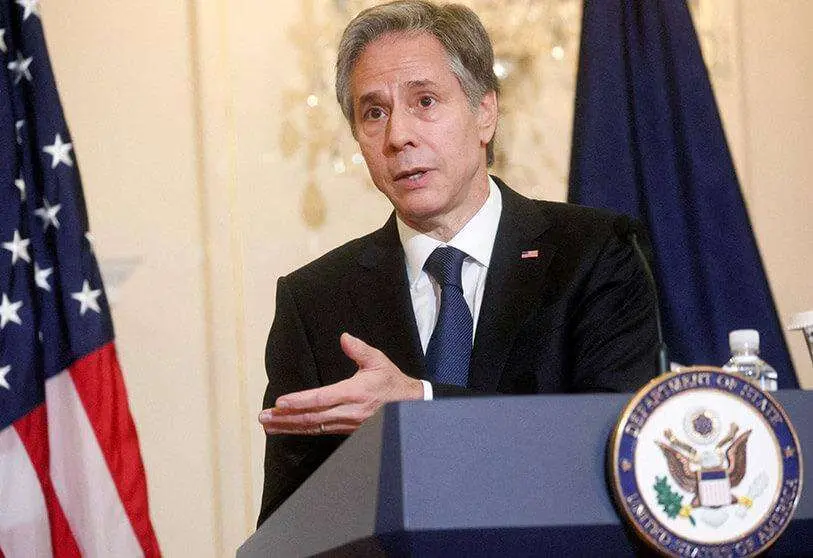US strikes a new blow to Iran's oil sector

The United States has sanctioned several international companies accused of involvement in Iran's oil and petrochemical trade, circumventing bans on Iran's crude oil sector. "The United States is taking new steps to stop attempts to evade sanctions on the sale of Iranian oil and petrochemical products," Secretary of State Antony Blinken said in a press release.
The sanctioned companies include Zhonggu Storage and Transportation Co. Ltd and WS Shipping Co Ltd, both based in China. The former is accused of operating a crude oil storage facility for Iranian oil, while the latter is accused of transporting Iranian oil products. Washington has also sanctioned other companies in Hong Kong, Iran, India and the United Arab Emirates.
The State Department recalls that these new measures are taken under Executive Order 13846, which authorises the imposition of sanctions on trade in Iranian oil, petroleum products and petrochemicals.

"As long as Iran continues to accelerate its nuclear programme in violation of the JCPOA (the Joint Comprehensive Plan of Action), we will continue to apply sanctions on Iran's sales of petroleum and petrochemical products," Blinken noted in the press release. The secretary of state also said that anyone wishing to avoid US sanctions must immediately halt "these illegal sales and transactions".
In a separate statement, the Treasury Department refers to the sanctioned companies as "an international network" involved in the sale of Iranian oil and petrochemical products - valued at hundreds of millions of dollars - to Southeast Asian countries.
The Treasury Department accuses the companies of "concealing" the origin of the products and facilitating two sanctioned Iranian companies - Triliance Petrochemical Co. Ltd. (Triliance) and Persian Gulf Petrochemical Industry Commercial Co. (PGPICC) - to ship Iranian oil and other products to Asian countries.

"The United States is committed to severely curtailing Iran's illicit sales of crude oil and petrochemical products," said Treasury Under Secretary for Terrorism and Financial Intelligence Brian E. Nelson, who also warned that sanctions will continue to be imposed until Tehran complies with the Joint Comprehensive Plan of Action (JCPOA).
Through this treaty signed in 2015, Iran pledged to reduce the production of enriched uranium and the number of gas centrifuges, as well as to allow monitoring by the International Atomic Energy Agency (IAEA). However, after Donald Trump pulled the US out of the deal in 2018 and reimposed tough economic sanctions on Tehran, Iran began to breach the pact's nuclear restrictions.
The former US president defended his decision by claiming that the deal was "poorly negotiated", as even if Iran complied with everything, it would be close to achieving "nuclear weapons in a short period of time".

Since April 2021, US officials have been working with their European and international partners to revive the 2015 agreement with Iran. However, despite numerous rounds of negotiations, the parties have not been able to reach a common ground. For Tehran, it is imperative that Washington lift economic sanctions and remove the Islamic Revolutionary Guard from the list of foreign terrorist organisations.
In addition to these differences, tensions between the US and Iran have increased in recent months over Tehran's military support for Moscow during the invasion of Ukraine, where the use of Iranian drones by Russian troops has been confirmed.
Shahed-136 drones Iran supplied to Russia have successfully struck Odessa again this morning. Looks like at least 2 drones hit the same location. pic.twitter.com/Y7nEJRGOGD
— Kyle Glen (@KyleJGlen) September 25, 2022
Moreover, the current protests sparked by the death of young Kurdish woman Mahsa Amini at the hands of the morality police for improperly wearing a headscarf have deepened this rift. The US has strongly criticised the violent crackdown on protesters and has sanctioned the morality police and several heads of security organisations. Iran, for its part, accuses Washington of fuelling the protests.
The chant now in Iran: “We will fight, we will die, we will take Iran back” pic.twitter.com/3ZAwzRnU6B
— Frida Ghitis (@FridaGhitis) September 28, 2022
The Treasury Department alludes to these issues in the statement announcing the sanctions. "We remain concerned about Iran's policies, from its nuclear programme, to abuses against its own people, to support for Russia's war of aggression against Ukraine with drones and military training, to destabilising activities throughout the region," it adds.
Today Odessa was again attacked by Shahed-136 kamikaze drones, which Russia got from Iran. Ukrainian army mastered to successfully land Russian aircraft, and these drones will follow. For that Ukraine needs more Western modern air defense systems. Drone launcher video below. pic.twitter.com/jZvYupj2IR
— Maria Avdeeva (@maria_avdv) September 25, 2022
All these problems make a return to the nuclear deal difficult despite diplomatic efforts in recent months. Blinken himself recently acknowledged in an interview on CBS's 60 Minutes that he does not "see any near-term prospects" for a return to the nuclear deal with Iran. Blinken explained that Iran has tried to add issues to the negotiations that Washington will not accept.
The president of Iran previously told 60 Minutes that he would consider re-entering the deal to restrict Iran’s nuclear weapons program. But Secretary Blinken says Iran’s response to the most recent proposals has been “a very significant step backwards.” https://t.co/YMBVtVhdE0 pic.twitter.com/Z5ZO6Ukr9d
— 60 Minutes (@60Minutes) September 25, 2022
"We will not accept a bad deal, the response they have given to the latest proposals put forward by our European partners have been a very significant step backwards," he added.
Americas Coordinator: José Antonio Sierra










